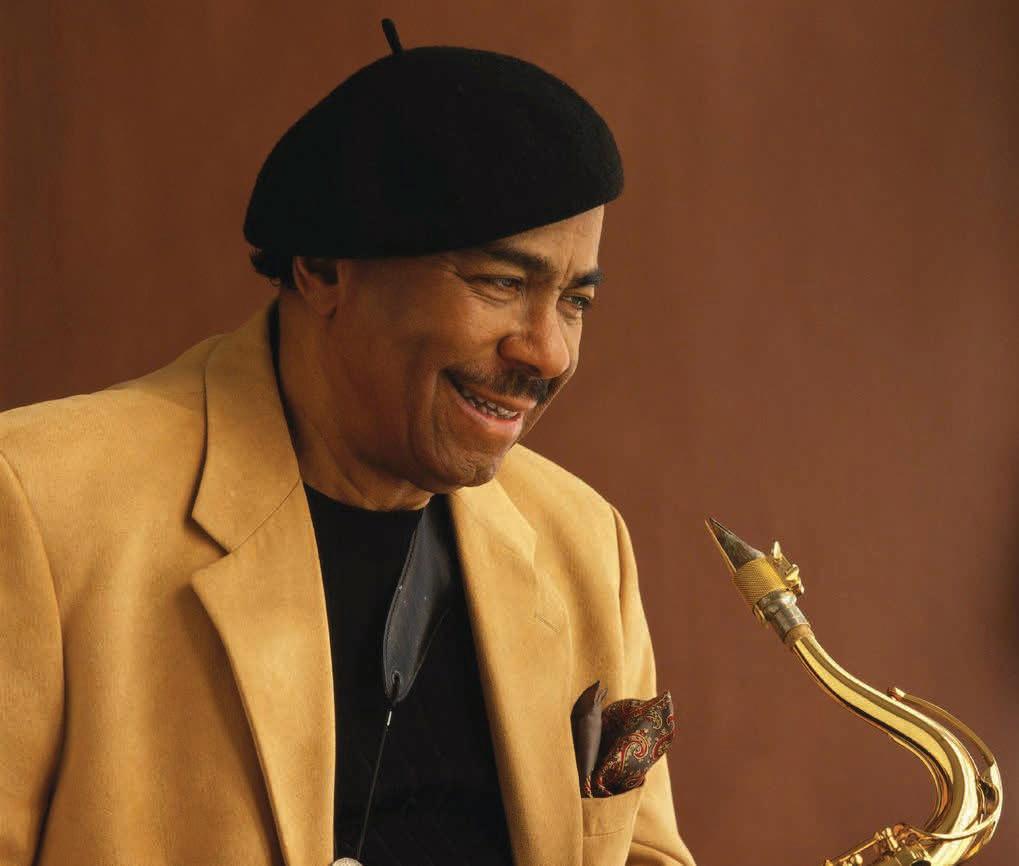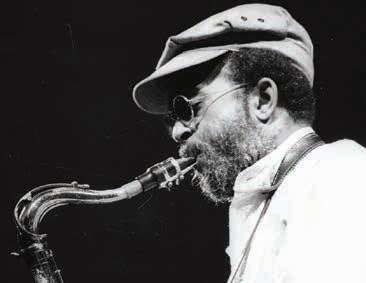
8 minute read
Monty Alexander by Alvin Carter Bey
Jamaican Jazz Pianist, Composer, Bandleader, Educator MONTY ALEXANDER
Born Montgomery Bernard, MA was born June 6, 1944, in Kingston, Jamaica. He is one of a handful of Jamaicans to make any significant impact on Jazz.
MA Interview by Alvin Carter-Bey on April 5, 2015.
ACB: And we have one of the most fantastic pianists in the world, a cat who comes from the island of Jamaica, who is a great individual. The last time I saw him in person was on the far south side with the Burgess Gardner Orchestra. He and laid us out with a great piano work. We’re talking about the one and only Mr. Monty Alexander. Monty, how are you, sir? MA: I’m very good, Al, and glad to be speaking with you on this beautiful Sunday, sir. ACB: You’re up in New York dealing with the cold weather. MA: It still got the chill in the air, brother, for sure. ACB: Oh, listen to you. You are such a wonderful person. The last time I saw you was 10 years ago. MA: Yeah. ACB: I was with WBEE and we did a jazz show that included you and the Burgess Gardner Orchestra at the Harambee House. MA: I have a recollection of that. It was a good event. I had a good time. Yes, sir. ACB: Good. Listen, talk about your relationship with Ray Brown and Milt Jackson, how were they? MA: Oh, they were beautiful relationships. Deep, life affecting. Those were great men, human beings, besides being masters of jazz. They accepted me in friendship and respected me as a musician. I felt like my whole world increased by being in company with them. I had so many adventures in their company, traveling on the road, playing in Europe and Japan. And the way we came together. I met Milt when I was playing at Jilly’s in New York, where Frank Sinatra used to spend time when he was in New York, in the 1960s. I got to know Milt very well. One of my other heroes of music that I had seen on the record cover was Ray Brown. I got to meet Ray and, then, we made music together. In fact, the 1969 album was beautiful. We did Savage Man Hold. That’s what it was called. They were big-time individuals in my life. ACB: So, how was the feeling? They were the big-time individuals and you were a young guy, right? MA: The feeling is indescribable. When I think back to those times when they were Royalty. They owned it. They weren’t trying to do this thing. They did it. That’s who they were. Every note they played was who they are. And to come from Jamaica, just a few years before, and be so grateful to be in the U.S., this land that gave us so much, so many riches with our music and to be there with them, to be one of them and being a part of what this contribution was, you know, you’re sitting on the piano with three other men. Somebody is playing the drums and there’s Mr. Ray Brown on the bass and Milt Jackson heating it up. And the smoke is coming from their heads, it was a good feeling. You’re saying, “I’m not going there. I’m there!” That’s the way it happened. This is the real place. I mean, these are the descendants of Charlie Parker, Louis Armstrong, and the Kings of all music. To have been with them was just indescribable and I keep this legacy alive when I play music, today. All of what those men shared with me and whatever I picked up, that’s what I play, today, when 1’m doing something relative to my home culture of Jamaica. It has to do with how you go about it. You don’t mess around. You go right for the jugular. ACB: Yes. We’re talking to Monty Alexander and it’s a pleasure to talk to you from Hyde Park, Chicago, at WHPK 88.5 FM. I’m your impresario, Al Carter- Bey. Listen, Monty, who were some of your early influences? MA: You know, growing up in Kingston, Jamaica you hear all the island music around you, which was a big influence to me. When I started hearing the music from the U.S.A., I heard Rhythm and Blues music that we all loved. I saw so many guys come to Jamaica and perform.
When I saw Pops Satchmo, Louis Armstrong, one of my forever eternal heroes, that was a great moment. My other hero was Nat King Cole, who I saw in Jamaica, also. Those two men made me realize, that living in that world of jazz is a higher form of expression. But it was also uplifting, making people feel good. So, those were my heroes. Other pianists who impacted me were the great Eddie Haywood in Jamaica and Errol Garner was another master. Many instrumentalists, saxophones, and trumpeters like my dear friend who just departed, Clark Terry. I played with Clark a lot. I played with Harry Sweet Edison. Those are the people that accepted me. So, I have heroes, man. But not just in jazz. In popular music, too. I’ve heard whole American repertoire. I saw Sam
Cook. Jackie Wilson, and Brook Benton. Those guys brought us the music that made you tap your foot. ACB: Yeah. Were you always a pianist? MA: There was a piano in the house. I had the good fortune that my mother had a piano and she wanted to learn to play it. It was an old upright piano. I was three or four years old. I ventured over to the keys and made sounds. This was my best friend, this thing called piano. It was a big toy. I had a lot of enjoyment, sitting there, making sounds, melodies, and rhythms. By the time I was seven years old. I was putting on a show for the neighbors who would come by and say, “Monty,
play the piano.” I’d have to go play it. I did it because I loved doing it, you know. ACB: And you ‘ve really been playing some great music. In fact, you‘ve got some new music, now, Harlemof my home country, Jamaica. As a kid, I used to play in the recording studios. Sneaking out of school, going to the studios recording, playing on the piano, behind some of those popular artists who preceded Bob Marley and Jimmy Cliff. So, I was there in the beginning. I loved to hook up with fellow Jamaicans who know are masters of that whole scene. I had a wonderful time, doing two recording, where I made a salute to Bob Marley’s music. Those recordings were well-received by many. So, I started doing more of it. I called it Harlem-Kingston as a way of expressing this is a part of my life journey. I was in my 20s, in New York City, playing in Harlem at Minton’s Play House, and, again, in the 1970s. Coming from Kingston to Harlem was a journey. And there are all the
other points in between. So, it’s the Harlem-Kingston Express. I’ve been doing that to great satisfaction, traveling, worldwide. Just two weeks ago, I played in Germany. I go to Japan and people enjoy it because it’s a coming together of two different worlds that meet, seamlessly.

Kingston. MA: Kingston Express. ACB: And The River Rolls On. Tell us about this recording. MA: Well, that’s probably my 70th CD in my career. I’ve made so many in different idioms, always jazz. But, 15 to 20 years ago, I was enjoying the new versions of what came out
ACB: Were there ever any discouragements in your life from popular to R&B to Jazz? At one point, in the world of music, Jamaican music was popular. But you chose to stay within the idiom of jazz. MA: I played what I liked. When you have a love for something and passion, and you’re not thinking about ulterior motives, you know. We all want to pay the rent and live well. And have the biggest house, a big car, and all that stuff. But that wasn’t important to me. I enjoyed playing music in a way that I wanted to. I tapped into the world of jazz. Jazz is not what you do but how you do it. It’s how you go about it. So, I can take any song and make it in Monty Alexander’s style. And it’s going to be freedom for me. I never had any discouragements because, when you love something, you’re not thinking about you shouldn’t be doing this or you shouldn’t be doing that. ACB: That brings me to my next question. Monty Alexander and the Chicago Jazz Orchestra on April 11th, we look forward to hearing you and seeing you on South Michigan Avenue. You haven’t been in Chicago, since the last time I brought you here, almost ten years ago. MA: I’m telling you it’s such a long. It’s an historic moment. My first time playing in Chicago may have been in 1969, at the London House. I played at the London House several times and other places. I used to play on Rush Street at the Backroom. You remember the Backroom? ACB: Yes, sir. MA: And I used to play at Casablanca? No, Rick’s Cafe. ACB: Yes. MA: Milt Trenier had his club and all the beautiful spots with great music that Chicago has given the world. Chicago is very important to me. I feel like I am returning home. I’m looking forward to a diverse audience who supports the jazz orchestra and who are jazz lovers who get the word out to some of my home country people. There’s a large group of people from Jamaica living in Chicago. So, I’m looking forward to seeing the folks from there too. ACB: Hey, Monty, thank you very much for your time. I’ve got to thank Ahmed Benbayla for hooking you and me up, after ten years. It’s a wonderful feeling. MA: I’m so glad that Ahmed got us together. ACB: Absolutely. MA: And he really has done wonderfully. So, I look forward to seeing you. ACB: Yes. MA: Thank you for playing my music. ACB: All right. Thank you very much. Have a wonderful day and a beautiful life. MONTRY ALEXANDER: You too, my brother, bye-bye. ACB: Take care. Bye-bye.












